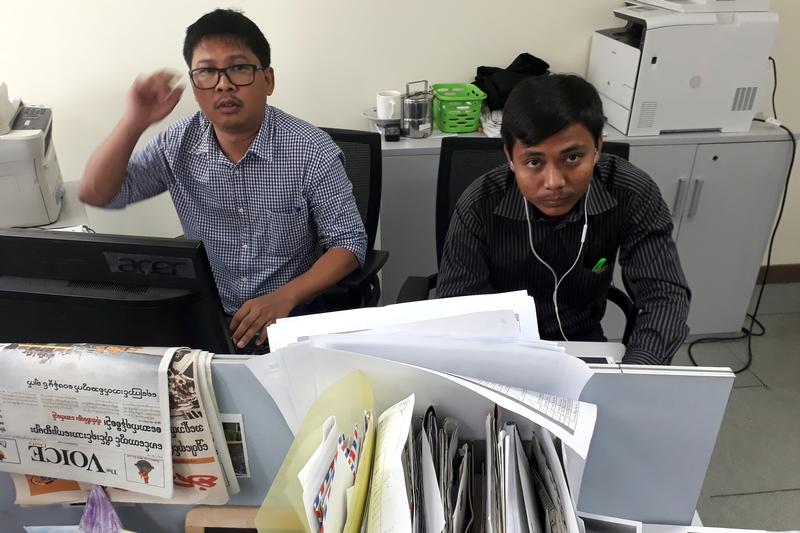Dozens of Pulitzer Prize-winning journalists have joined a growing chorus of voices demanding the release of two Reuters reporters detained by Burmese authorities earlier this month, calling their arrests “an outrageous attack on media freedom.”
“Wa Lone and Kyaw Soe Oo are brave, principled and professional journalists who were working in the public interest and were jailed simply for doing their jobs,” reads a joint statement released on Wednesday by a roster of 50 awardees of the industry’s most distinguished honour.
“We call on the Myanmar government to immediately release Wa Lone and Kyaw Soe Oo, reunite them with their families, and drop all charges against them,” it concluded.
The list of signatories includes four of the detained men’s Reuters colleagues and the influential New York Times columnist Nicholas Kristof. Also affixing their signatures were two Associated Press reporters who won a Pulitzer in 2016 for reporting on the seafood industry in Southeast Asia, which documented the slavery-like conditions that many Burmese endure on fishing vessels off the coasts of Indonesia and elsewhere.
Wa Lone, 31, and Kyaw Soe Oo, 27, were detained on 12 December on the northern outskirts of Yangon, where they were meeting with two police officers who were also arrested and charged under the colonial-era Official Secrets Act.
The Reuters duo appeared in court on Wednesday, two weeks after they were taken into custody and marking the first time that they were allowed to see family members since they were detained. Their whereabouts were not made publically known previously, and at Wednesday’s hearing they were remanded for another 14 days.
Facing charges under section 3 of the Official Secrets Act, the two men could be imprisoned for up to 14 years if convicted.
Authorities allege that they were apprehended in possession of sensitive government documents. Though Reuters has declined to offer details on what the journalists were working on at the time they were arrested, it has been widely reported that the controversial detention relates to their coverage of restive Rakhine State.
Reuters has been at the forefront of reportage on the latest crisis in Rakhine, where press access has been severely restricted since late August.
The Pulitzer-winning signatories to Wednesday’s statement are the latest to criticise what the US Embassy has called “highly irregular arrests.”
“For a democracy to succeed, journalists need to be able to do their jobs freely,” the embassy said in a statement on 13 December. “We urge the government to explain these arrests and allow immediate access to the journalists.”
Speaking to DVB on Friday, Reg Chua, Reuters’ chief operating officer, said: “In general, when journalists are held in jail — when they’re arrested or they are intimidated or they’re threatened — it sends a chilling signal to the practice of journalism and that’s bad for society because societies need a free press, they need journalists and they need good journalism.”
Domestically, a coalition of a dozen Burmese media advocacy groups has also come to the defence of the two Reuters journalists.
“We understand that journalists cannot publicise any information that would endanger national security. However, it is a threat to press freedom to accuse the two journalists of having violated the Official Secrets Act after only being found to have in their possession some of the information,” read a 14 December statement from the groups.
[related]
Even UN Secretary-General Antonio Guterres has made his worries known, tying the journalists’ legal troubles to their work in the highly sensitive Rakhine State conflict zone.
“It is clearly a concern in relation to the erosion of press freedom in the country,” he said during a news conference in Tokyo on 14 December.
“And probably the reason why these journalists were arrested is because they were reporting on what they have seen in relation to this massive human tragedy,” he added.



